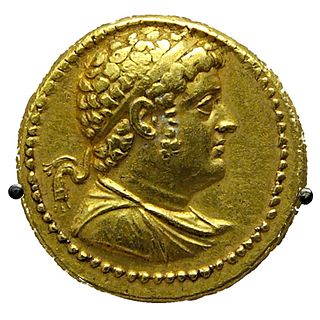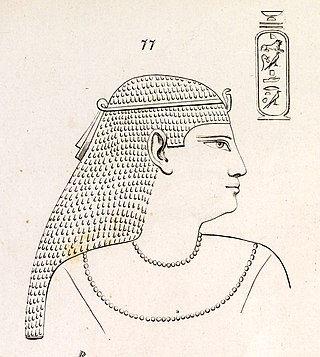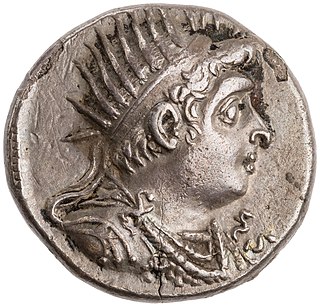Sources
Primary sources
Secondary works
- Edwyn Bevan, The House of Ptolemy, Chapter 7, passim
- Walter Ameling, "Tlepolemos [4]" in Der neue Pauly vol. 12 part 1 p. 636 f.
Tlepolemus was regent of Egypt in the Ptolemaic period under the reign of the boy-king Ptolemy V. He was briefly prominent at the end of the 3rd century BC; his dates of birth and death are not known.
Tlepolemus was a member of a distinguished Persian family who had migrated to Egypt in the late 3rd century BC. [1] He was strategos (military governor) of the region of Pelusium in 202 BC when the regent Agathocles and his family were overthrown and killed in a popular uprising. Tlepolemus took Agathocles' place as regent, but held it only until the following year, 201 BC, when he was in his turn replaced by Aristomenes of Alyzia.
Year 202 BC was a year of the pre-Julian Roman calendar. At the time it was known as the Year of the Consulship of Geminus and Nero. The denomination 202 BC for this year has been used since the early medieval period, when the Anno Domini calendar era became the prevalent method in Europe for naming years.

This article concerns the 200 BC decade, that lasted from 209 BC to 200 BC.

Ptolemy IV Philopator was the fourth pharaoh of Ptolemaic Egypt from 221 to 204 BC.

Ptolemy V Epiphanes Eucharistos was the King of Ptolemaic Egypt from July or August 204 BC until his death in 180 BC.

Cleopatra I Syra was a princess of the Seleucid Empire, Queen of Ptolemaic Egypt by marriage to Ptolemy V of Egypt, and regent of Egypt during the minority of their son, Ptolemy VI, from her husband's death in 180 BC until her own death in 176 BC.

Ptolemy VI Philometor was a Greek king of Ptolemaic Egypt who reigned from 180 to 164 BC and from 163 to 145 BC. He is often considered the last ruler of ancient Egypt when that state was still a major power.

Lysimachus was a Thessalian officer and successor of Alexander the Great, who in 306 BC, became King of Thrace, Asia Minor and Macedon.

Ptolemy VIII Euergetes II Tryphon, nicknamed Physcon, was a king of the Ptolemaic dynasty in Egypt. He was the younger son of King Ptolemy V and Queen Cleopatra I. His reign was characterised by fierce political and military conflict with his older siblings, Ptolemy VI and Cleopatra II.

Ptolemy Ceraunus was a member of the Ptolemaic dynasty and briefly king of Macedon. As the son of Ptolemy I Soter, he was originally heir to the throne of Ptolemaic Egypt, but he was displaced in favour of his younger brother Ptolemy II Philadelphus. He fled to King Lysimachus of Thrace and Macedon where he was involved in court intrigue that led to the fall of that kingdom in 281 BC to Seleucus I, whom he then assassinated. He then seized the throne of Macedon, which he ruled for seventeen months before his death in battle against the Gauls in early 279 BC. His epithet Ceraunus is Greek for "Thunderbolt" and referred to his impatient, impetuous, and destructive character.
Sosibius was the chief minister of Ptolemy Philopator, king of Egypt. Nothing is known of his origin or parentage, though he may have been a son of Sosibius of Tarentum; nor have we any account of the means by which he rose to power; but we find him immediately after the accession of Ptolemy, exercising the greatest influence over the young king, and virtually holding the chief direction of affairs. He soon proved himself, as he is termed by Polybius, a ready and dexterous instrument of autocracy: it was by his ministration, if not at his instigation, that Ptolemy put to death in succession his uncle Lysimachus, his brother Magas, and his mother Berenice. Not long after, Cleomenes, of whose influence with the mercenary troops Sosibius had at this time dexterously availed himself, shared the same fate.
Agathocles was a Ptolemaic minister and together with his sister Agathoclea was very close to Egyptian king Ptolemy IV Philopator.
The Partition of Triparadisus was a power-sharing agreement passed at Triparadisus in 321 BC between the generals (Diadochi) of Alexander the Great, in which they named a new regent and arranged the repartition of the satrapies of Alexander's empire among themselves. It followed and modified the Partition of Babylon made in 323 BC upon Alexander's death.
Agathoclea was the favourite mistress of the Greco-Egyptian Pharaoh Ptolemy IV Philopator who reigned 221–205; sister of Ptolemy IV’s minister Agathocles.
Aristomenes of Alyzeia or Aristomenes the Acarnanian was regent and chief minister of Egypt in the Ptolemaic period during the reign of the boy king Ptolemy V.
Theoxena was a Greek Macedonian noblewoman. Through her mother's second marriage, she was a member of the Ptolemaic dynasty and through marriage was a queen of Sicily, Magna Graecia.
Archagathus was a Syracusan from Magna Graecia prince and Ptolemaic official who lived around the late second half of the 4th century BC and first half of the 3rd century BC.
Theoxena, also known as Theoxena the Younger to distinguish her from her mother, was a Syracusan Greek Princess of Magna Graecia and was a noblewoman of high status.
Oenanthe, who flourished in the 3rd century BC and died in 203 BC, was an Egyptian Greek noblewoman who, through marriage, was a relation of the Ptolemaic dynasty.
Ptolemy Epigonos was a Greek Prince from Asia Minor who was of Macedonian and Thessalian descent.
Pelops was an official in the third century Ptolemaic kingdom, son of Pelops, son of Alexander, who had himself been a Ptolemaic official.